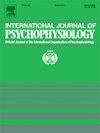睡眠限制和光照强度对认知挑战中脑力劳动的影响
IF 2.5
3区 心理学
Q3 NEUROSCIENCES
引用次数: 0
摘要
我们研究了睡眠时间和光照强度对与努力有关的心血管反应的影响。我们预测,由于睡眠时间缩短后警觉性降低,感知到的任务需求应该会增加,从而导致更高的脑力劳动。同样,较低的光照强度也会导致警觉性降低,从而使感知到的任务需求增加,进而导致脑力劳动增加。努力程度是指交感β-肾上腺素能对心脏的影响,并通过心脏射血前期(PEP)和收缩压(SBP)的反应来评估。24 名健康志愿者分别在睡眠 5 小时和 8 小时后进行了两次实验,实验顺序为平衡顺序(人内)。实验照明条件(100 lx 与 500 lx,人内)持续 15 分钟,并在随后的 5 分钟改良听觉斯滕伯格任务中使用。与我们的假设一致,结果显示睡眠限制后 SBP(和 DBP)反应性更强(ps本文章由计算机程序翻译,如有差异,请以英文原文为准。
Effects of sleep restriction and light intensity on mental effort during cognitive challenge
We investigated the effects of sleep duration and light intensity on effort-related cardiovascular response. We predicted that due to reduced alertness after shortened sleep duration perceived task demand should increase which should lead to higher mental effort. Similarly, lower light intensity should also lead to lower alertness, and therefore to higher perceived task demand and therefore higher effort. Effort was operationalized as sympathetic beta-adrenergic impact on the heart and assessed through reactivity of the cardiac pre-ejection period (PEP) and systolic blood pressure (SBP). Twenty-four healthy volunteers underwent two experimental sessions, one after 5 and one after 8 h of sleep opportunity in a counterbalanced order (within-person). Experimental lighting conditions (100 lx vs. 500 lx, within-person) were applied for 15 min, and for following 5-min modified auditory Sternberg task. In line with our hypothesis, results showed a stronger SBP (and DBP) reactivity after sleep restriction (ps < 0.001), indicating higher effort exertion. Contrary to our prediction, 500 lx light led to higher PEP reactivity compared to 100 lx (p = 0.032). Overall, our results provide the first experimental evidence that shorter sleep duration leads to higher mental effort.
求助全文
通过发布文献求助,成功后即可免费获取论文全文。
去求助
来源期刊
CiteScore
5.40
自引率
10.00%
发文量
177
审稿时长
3-8 weeks
期刊介绍:
The International Journal of Psychophysiology is the official journal of the International Organization of Psychophysiology, and provides a respected forum for the publication of high quality original contributions on all aspects of psychophysiology. The journal is interdisciplinary and aims to integrate the neurosciences and behavioral sciences. Empirical, theoretical, and review articles are encouraged in the following areas:
• Cerebral psychophysiology: including functional brain mapping and neuroimaging with Event-Related Potentials (ERPs), Positron Emission Tomography (PET), Functional Magnetic Resonance Imaging (fMRI) and Electroencephalographic studies.
• Autonomic functions: including bilateral electrodermal activity, pupillometry and blood volume changes.
• Cardiovascular Psychophysiology:including studies of blood pressure, cardiac functioning and respiration.
• Somatic psychophysiology: including muscle activity, eye movements and eye blinks.

 求助内容:
求助内容: 应助结果提醒方式:
应助结果提醒方式:


